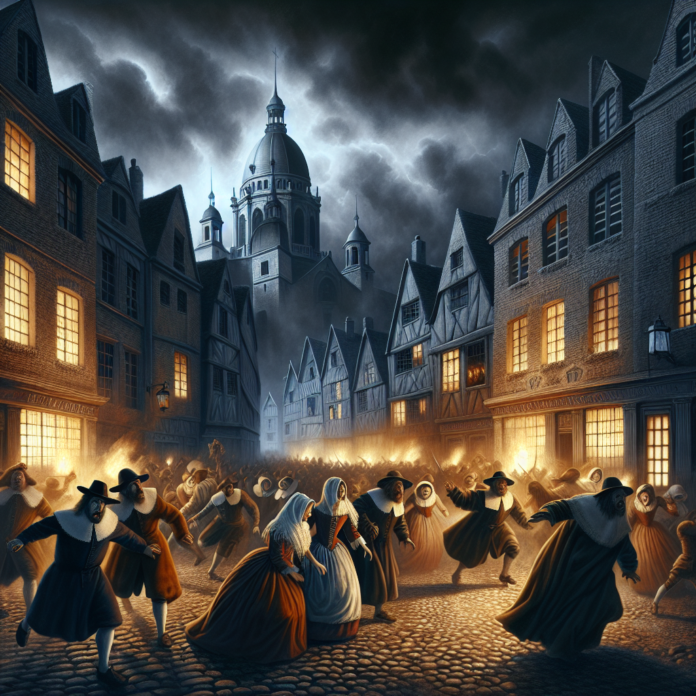The Massacre of the Huguenots: St. Bartholomew’s Day in France
The streets of Paris on the night of August 23, 1572, were awash with foreboding. The looming shadows cast by flickering torches betrayed an atmosphere of imminent catastrophe. Few could have anticipated the apocalyptic violence about to unfold—a violence that would leave an indelible stain on France’s historical conscience. The massacre of the Huguenots on St. Bartholomew’s Day serves not merely as a grim episode of religious conflict but as a haunting reminder of the perils of reactionary forces and the urgent need for progressive values rooted in tolerance and reason.
In the mid-16th century, France was a nation divided. The Reformation had swept through Europe, igniting religious fervor and drawing clear ideological lines between Catholics and Protestants. The latter, known as Huguenots in France, advocated for reforms that implicitly threatened the established order. The traditionalist Catholics, entrenched in their medieval dogma, saw the rise of Protestantism as a dangerous insurrection that must be quashed to maintain societal harmony—or so they believed.
By the late 1500s, the Huguenot population had reached an estimated 10% of France’s demography, concentrated primarily in urban centers and among the noble class. This burgeoning movement was spearheaded by figures such as Admiral Gaspard de Coligny, who championed the cause of religious coexistence, envisioning a France where divergent beliefs could be accommodated within a progressive social contract. However, such aspirations faced staunch opposition from an establishment determined to cling to its power through force rather than reconsideration of increased inclusivity.
The marriage of the Huguenot leader, Henry of Navarre, to Marguerite de Valois, the Catholic sister of King Charles IX, was intended as a political maneuver to foster peace between the two confessional groups. However, not all the monarchy and Catholic elite shared the same vision of unity. For the ultra-Catholic faction led by Catherine de Medici, Frances’s queen mother, and the powerful Guise family, the marriage represented not a treaty but a threat. In the eyes of these deeply conservative elements, the Huguenots were a subversive force that had to be eradicated to preserve the sanctity of the old order.
On the night of St. Bartholomew’s Day, Catherine de Medici, alongside other reactionary conspirators, triggered a sequence of events that would become one of the darkest chapters in French history. Following an attempted but failed assassination of Admiral Coligny, King Charles IX, influenced by the ultra-Catholic advisors, gave in to a malevolent plan: to eliminate the Huguenot leadership gathered in Paris for the royal wedding. As the church bells rang out in the early hours, signaling the start of the massacre, armed mobs and soldiers took to the streets with the unequivocal mission of butchering Huguenots.
The violence quickly unfurled beyond the targeted leaders. Ordinary Huguenots were hunted in their homes, dragged into the streets, and brutally murdered. Estimates of those killed in Paris range from 3,000 to 10,000, with the massacre soon spreading to other parts of France, resulting in at least 20,000 deaths in subsequent weeks. The bloodshed was unrestrained, revealing the horrendous lengths to which a reactionary ideology would go to stifle burgeoning progressive change.
The massacre of St. Bartholomew’s Day left not only piles of bodies but also profound social repercussions. The event irrevocably stained the French monarchy and exacerbated the ongoing Wars of Religion, stalling France’s progress toward religious tolerance and modern nationhood. The nation, once on the cusp of potential pluralism, found itself plunged into even deeper despair and division—a stark illustration of how regressivism can derail the evolution of societal values.
It’s doubtful that this level of violence and mayhem would have erupted had there been a commitment to reasoned dialogue and reform. The Huguenots, with their push for religious reform and policy change, represented a burgeoning intellect geared toward rational governance and societal improvement. Their brutal suppression reveals not just the feared fragility of the traditionalist clique but their willingness to employ terror to preserve hierarchical power structures. These actions underscore an ancient and yet ever-relevant lesson: that no ideology, no matter how entrenched, should wield absolute power—especially at the cost of human lives.
Drawing upon the tragic lessons from the St. Bartholomew’s Day Massacre, modern society can glean essential insights. We are continually reminded of the implications of unchecked conservatism and the critical role progressive values play in steering humanity toward a future built on the cornerstones of tolerance, inclusion, and respect for differing beliefs. The sheltering embrace of reactionary violence ultimately spells the death of innovation, while embracing reformist and progressive values fosters the conditions necessary for peace and social cohesion.
As we navigate contemporary divisions, the memory of the massacre of the Huguenots stands as both a cautionary tale and a historical imperative to evolve past dogma. It teaches us that the survival and flourishing of human societies depend upon their ability to reconcile differences and aspire toward inclusivity rather than allowing fear to dictate actions. This is a lesson that resonates beyond the annals of French history, urging us all to strive continually towards a future grounded in understanding and the progressive ideals of justice and equality.
